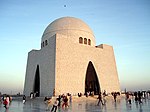Barbarikon
| Part of a series on the |
| History of Karachi |
|---|
 |
| Prehistoric period |
| Ancient period |
| Classical period |
| Islamic period |
|
| Local dynasties |
| British period |
|
| Independent Pakistan |
|
Barbarikon (
Mediterranean world.[1] It comes from the Greek word of the term (also in Latin, barbaricum), designating areas outside the Greco-Roman world
.
It may have been a translation from Sumerian word Meluhha for the Sindh from which the Sanskrit word for barbarian, Mleccha derives.

Barbarikon is mentioned briefly in the Periplus of the Erythraean Sea:
- "This river [the princes who are constantly driving each other out."
- "The ships lie at anchor at Barbaricum, but all their cargoes are carried up to the metropolis by the river, to the King. There are imported into this market a great deal of thin clothing, and a little spurious; figured . And sailors set out thither with the Indian Etesian winds, about the, month of July, that is Epiphi: it is more dangerous then, but through these winds the voyage is more direct, and sooner completed."
Its principal function beyond supplying its immediate hinterland was as a transshipment port for supplies of Persian turquoise and Afghan lapis lazuli, to be carried overland to Egypt.[2]
See also
References
- ISBN 9788120615496.
- .
External links
